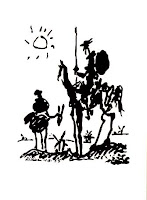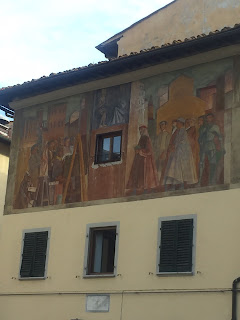The road ahead with Cervantes

I’ll start out by trying to excuse myself for my long absence from blogging. It’s been a pretty wild three-plus months, taking a full load of graduate classes, teaching two big sections of Spanish 202 and doing two symposium presentations (kind of like 2 extra research papers on top of my other responsibilities). In September I did a half-ironman distance triathlon and in early December I managed an OK half-marathon on pretty minimal training. I was also able to check some first-time lifetime blocks like doing my first mountain bike race with the A&M Cycling Team and my first cyclocross race, which probably deserves its own blog post. I also had my share of missed opportunities and boneheaded moves, but those are too numerous to list here. Margaret and I also spent our first semester with JD gone to college (which paid off with him making all A’s) and helped get Jackson through his first semester of high school.
To be sure, God has been good to the McGraw’s this year, which marks a turning point for me in a lot of ways, especially since this was my last semester of coursework in graduate school. In February I’ll take my preliminary exams, which is a battery of oral and written tests over the past 4 years of studies. Assuming I pass the exams OK, I’ll be considered “All But Dissertation” (ABD), which means all I’ll have left is to do my doctoral thesis to be a Pointy-head Doctor (PhD) in Hispanic Studies (a more academic-sounding way to say “Spanish”) . As I just wrote “All I’ll have left is to do my doctoral thesis” I threw up in my mouth a little bit, because the road to hell is paved with the bones of people who took all their coursework, then passed their exams and then, with “only” the dissertation remaining, never finished.
Yesterday, over Christmas dinner and dessert, some friends and family who live in the real world and have real grown-up jobs where they don’t let you wear shorts to work let me know that it seems like I’m really taking my sweet time finishing this graduate school thing. So here’s some attempt at an explanation of why the average time it takes to get a PhD (in liberal arts, anyway) is about seven years: By Texas state law, it takes a minimum of 96 graduate hours (including research on your thesis) to get a PhD. Since you can generally only take 9 hours per semester and maybe 3 hours the entire summer, you’re set up for a long slog through a degree plan that probably doesn’t give you much of a head start on your dissertation. And of course, since I didn’t come to the program with the expected skill set (a B.S. in Geography, an M.A. in Human Resources, and a 20 year Marine Corps career aren’t worth a bucket of warm spit to the Hispanic Studies Department at Texas A&M - or any Liberal Arts department in any university, I'm sure), I had to take 12 hours of upper-level undergraduate Spanish classes before even applying for admission to the graduate program.
The dissertation, on the other hand, has no real timeline. You’re done when you’re done, but in liberal arts it usually takes, best case, about 9 months to research and 9 months to write (source: my committee chair). The whole product, in either large chunks or small, has to be approved by all five members of the PhD committee, each of whom has about 1,000 other things to do besides perusing my chapters). The thing has to be finished by March and submitted to the University Thesis Office if you plan on graduating in May. It’s been explained to me by a prof in my department that a liberal arts thesis needs to be based on research over about 100 books and 200 journal articles. It should be between 250 - 350 pages and make some kind of new contribution to the field of study in which it is written. Mmm-hmmm.
So it’s a serious undertaking and that’s why I respect the achievements of the PhD’s in our department. It’s also why I don’t run around calling them by their first names unless they ask me to do so. We (grad students and professors) inhabit this academic aquarium and they’re the big fish and so far, I'm a little one until I finish the PhD.
So to anticipate the question, “So what are you going to do for your thesis, Mark?” I’d like to tell you a quick story: When the Marine Corps sent me to Guatemala to learn Spanish in 1997, we were all pretty concerned about terrorism (which was pretty stupid for anyone going to Guatemala at that time since being robbed at gunpoint was about 10,000 times more probable). We military guys didn’t wear uniforms or get haircuts down there, which oddly didn’t make us appear to be any less military. When I heard another military dude who, asked why he was down there learning Spanish, respond, “I always wanted to read Cervantes in the original language,” I thought that was pretty funny and I started saying it too, even though I only had a vague idea who Cervantes was.
A couple of years later, while serving in Chile, I was wandering around the Infantry School campus at Viña del Mar and I came across a statue of Miguel de Cervantes, the writer of Don Quixote. The statue commemorated his service as a Spanish Marine in the naval battle of Lepanto in 1571, where he was severely wounded by three gunshot wounds and lost the use of his left hand. I was impressed by the fact that Cervantes was both a Marine and a great writer, although I had never read Don Quixote.
In 2004, in my last year or so of active duty as a Marine officer, I was wandering through a bookstore in Miami and I happened across a commemorative 400th anniversary re-printing of Don Quixote. It is a great looking book that contains both volumes - all 1,106 pages, all in Spanish- and a whole bunch of footnotes and critical essays. I bought it for $11.95, no joke, which makes it sound like 70 years ago instead of 7. It was tough sledding, reading it in that old Spanish, but I was propelled forward by the discourses that Don Quixote himself made about the life and ethic of the knight, which he carefully connected to military service. See, when Don Quixote talked I heard a Marine talk. I served with many Quixotes in the modern Marine Corps: loyal, idealistic, romantic, impractical, and above all, considered by the rest of society to be a few sandwiches short of a picnic. So when I moved to College Station and eventually had the chance to go to graduate school and take a class on Don Quixote taught by Eduardo Urbina, a world-class Cervantes scholar who lives 2 doors down from me, the circle was closed.
My thesis will be on how nationalist, revolutionary, religious and political movements have taken the literary character of Don Quixote and appropriated him for their own propaganda and ideological purposes. It’ll be an attempt to see how we take art and apply it to real life, a view of literature’s practical impact outside of the literary world.
Don Quixote, by the world’s interpretation, was driven mad by reading too many books on chivalry and decided to strike out on adventures under the anachronistic identity of knight errant. When I was 14 years old I read Guadalcanal Diary and that book helped me decide to be a Marine, an idea that most of my high school classmates found laughable. Looking back on my Marine Corps career now I can honestly say I’m having the last laugh.
But now it’s another adventure and title: those of an academic. I will journey through four centuries of Quixote scholarship and touch the soul of another military writer now dead nearly four hundred years.
It is mission that could well be called quixotic.


